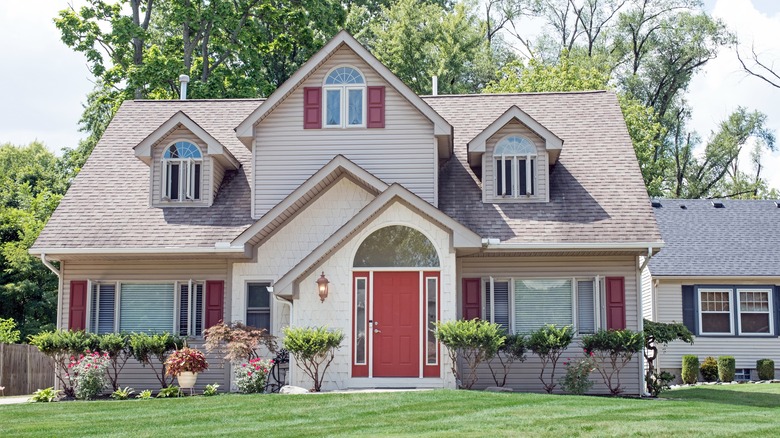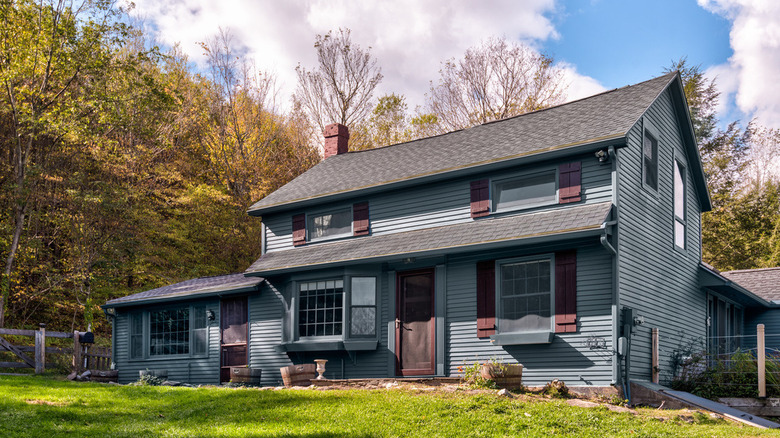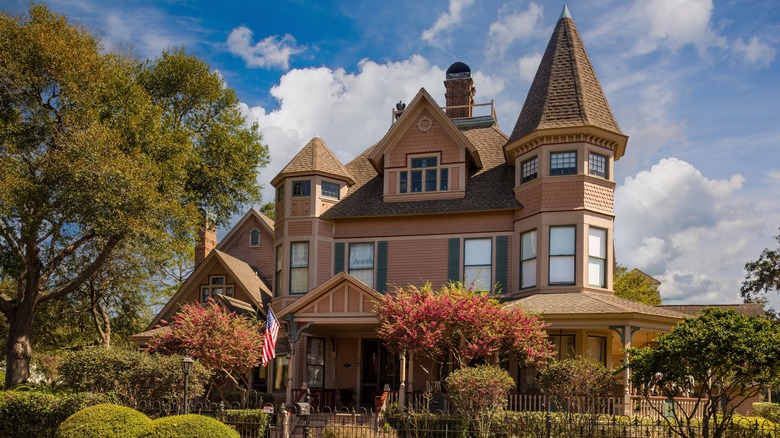Is It A Good Idea To Match Your Front Door And Shutters? Our Paint Color Expert Weighs In
Over time, the exterior of your home can start looking rather drab. Normal fading and weathering from exposure to the elements dulls the appearance, as does the slow accumulation of dust and dirt on its walls and in its crevices. A regular pressure wash will work wonders to eliminate layers of grime from the surface, but sometimes it takes a whole new paint job to really do the trick. And if you're feeling a little adventurous, updating your home's look with a more modern palette is a sure way to turn heads, as long as it's done stylishly. In that vein, is it necessary to paint your door and shutters the same color? House Digest spoke exclusively with Architectural Color Consultant Amy Krane, founder of Amy Krane Color, who confirmed that "it's never a bad call to have your front door and shutters match."
There are tried and true artistic reasons to keep to a simple color palette when painting your house, according to Krane, who says, "Repetition creates cohesiveness in a design." However, she also stresses that it's important to "take other factors into consideration as well," such as the architectural style of the house and the personality of its owners. Color can make bold declarations or quiet implications, depending on how it's used, so the most important question to ask when deciding how to paint your home's exterior is: What kind of statement do you want to make?
Cohesive accents or bold wayfinding?
A home will generally benefit from a simple cohesive color palette in which the trim, shutters, and front door all match to accentuate the color of the main body of the home with a certain amount of contrast. In an exclusive interview with House Digest, color expert Amy Krane said " ... they're there to punctuate those architectural details and add some 'dressing,' like jewelry or accessories for an outfit." To accomplish this, she continued, it's traditional to choose a color that opposes your body color in hue and/or shade. "A common choice is to go darker if the body color is light or mid-toned. If the house is dark, shutters and door rely more on changing up the hue to create the needed contrast." So a pale beige house with brick red or chocolate accents looks as beautiful as a deep navy house with white shutters and doors. Krane says, "It's a really elegant stately look to keep the palette so limited and therefore refined."
Alternatively, contrasting colors can be used to draw the eye. Krane posits, "Do you want to emphasize the wayfinding benefits of color .... If so, giving it a unique color furthers that goal." This is the case when a white home with black trim and shutters, for instance, benefits greatly from a bold and bright red front door. The distinct color instantly identifies the door as the focal point, the entrance, and the stand-out feature.
Bring out your personality and your architecture
Sometimes the stately and traditional just isn't your style, and that's okay. If you're thinking of adding a third color into your exterior home palette, expert Amy Krane offered some thoughts to consider in her exclusive conversation with House Digest: "Is your personality one where you find a polychrome house most appealing? If so, then add another color to the overall palette and have the shutters and door be unique. What style of architecture is the house? What is a customary distribution of color for that style and do you want to deviate from the norm? That will help you to decide whether the doors and shutters should have their own colors."
Paint can actually be a great way to define architectural details, both inside and outside your home, so if there's an aspect of interest, painting it with a bold accent color can call attention to it. This is true of arches and widow's walks as much as it is for large entryways. Also, as Krane intimates, certain architectural styles lend themselves to more whimsical paint color themes, such as turreted Victorians or the shotgun houses of New Orleans. Of course, nothing trumps the need to express your own personality in the look of your home. Colors have their own psychology. Yellow paint is optimistic, black represents sophistication, while white means cleanliness and blues are calming. Pick colors that tell the story of who you are and you won't be disappointed.


